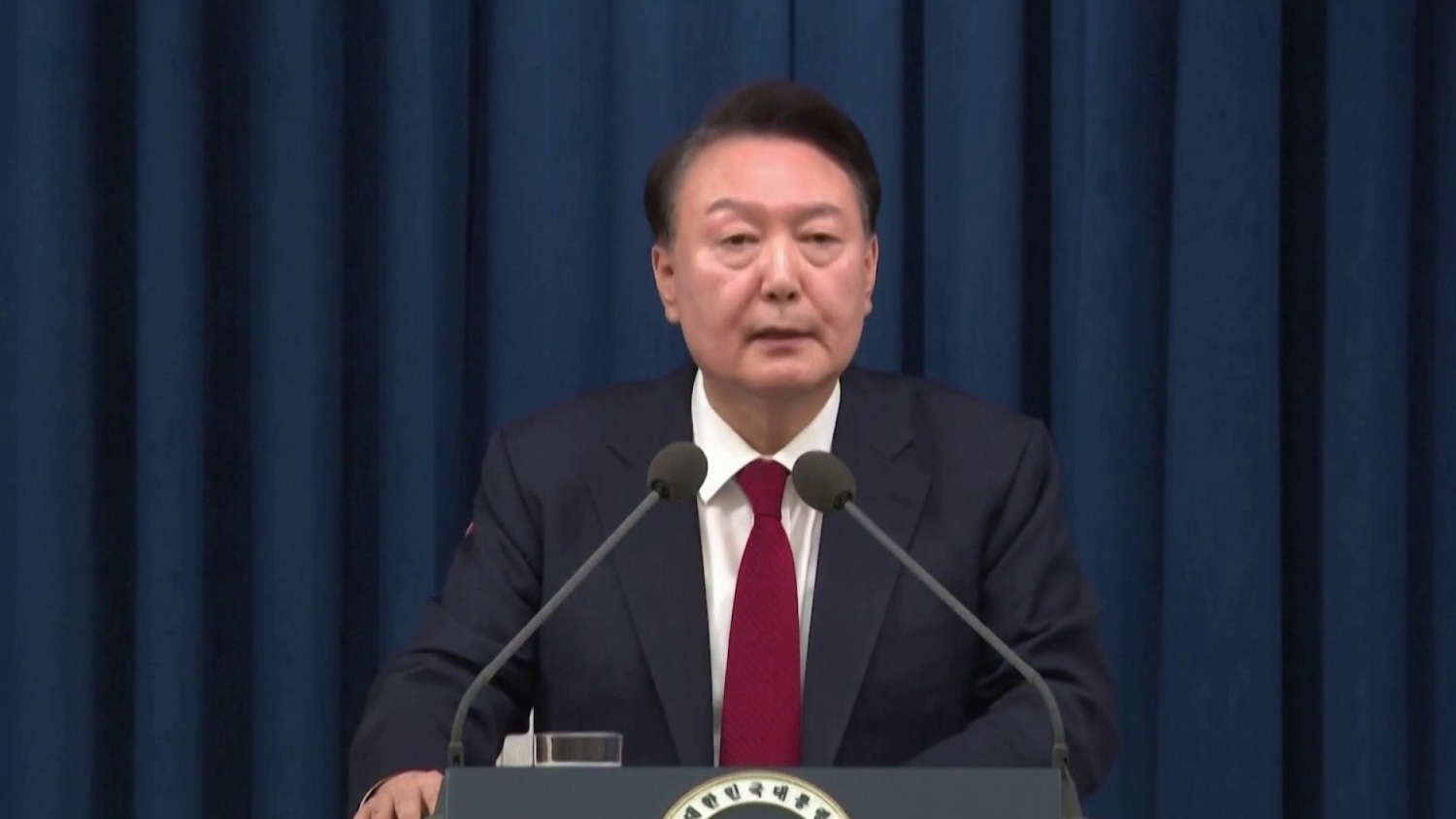South Korean President Yoon Suk Yeol has publicly apologised for his controversial attempt to impose martial law, which has triggered a significant political crisis in the country. In a televised address on Saturday, Yoon expressed regret for his actions and promised to accept any legal or political repercussions that may arise. The apology comes amid heightened tensions ahead of a parliamentary vote on his impeachment.
Public Apology And Promise To Never Repeat
During his address, Yoon conveyed deep remorse for the public concern and inconvenience caused by his martial law declaration. He stated that his ruling party, the People Power Party (PPP), would decide his political fate, emphasizing that he would never seek to impose martial law again. “I take full responsibility for my actions and am prepared to face any legal consequences,” Yoon declared in his somber speech.
)
Immediate Fallout From Yoon’s Speech
Shortly after the apology, PPP leader Han Dong-hun called for Yoon’s resignation, asserting that the president was unfit to remain in office. Han’s statement intensified the political turmoil, as opposition lawmakers moved forward with an impeachment motion against Yoon. However, uncertainty looms over whether the motion will secure the required two-thirds majority in the National Assembly.
The opposition currently controls 192 of the 300 seats in the National Assembly, needing at least eight PPP members to support the impeachment motion. Earlier this week, 18 PPP lawmakers voted to abolish martial law, signaling potential cracks within the ruling party.
Armed Forces Deployment Sparks Outrage
Yoon’s martial law declaration on Wednesday, accompanied by the deployment of heavily armed troops to the National Assembly, has alarmed both domestic and international observers. Opposition lawmakers accused Yoon of staging a self-coup and using rebellion charges as a pretext to strengthen his hold on power. The sight of military units surrounding the National Assembly to prevent the impeachment vote drew sharp criticism and heightened calls for his resignation.

Calls For Suspension Of Presidential Powers
On Friday, Han Dong-hun escalated his criticism by urging for the immediate suspension of Yoon’s presidential powers. Han warned that Yoon posed a serious risk to national security, alleging that the president had issued direct orders to arrest senior lawmakers during the brief period of martial law.
Han claimed that Yoon targeted key opposition figures, including himself, opposition leader Lee Jae-myung, and National Assembly Speaker Woo Won Shik, branding them as engaging in “anti-state activities.” These allegations further inflamed political tensions, with Han accusing Yoon of overstepping his authority and undermining democratic institutions.
Defence Ministry’s Response To Martial Law Crisis
In response to the escalating crisis, the South Korean defence ministry has taken decisive action. Several high-ranking officials, including Yeo In-hyung, the defence counterintelligence commander, have been suspended. Yeo was allegedly instrumental in carrying out Yoon’s orders to detain opposition lawmakers.
Former Defence Minister Kim Yong Hyun, who is suspected of advising Yoon to declare martial law, is now under investigation on rebellion charges. His sudden resignation earlier this week has only added to the controversy surrounding the administration’s actions.

Acting Defence Minister Testifies Before Parliament
Kim Seon Ho, the acting defence minister following Kim Yong Hyun’s resignation, has provided testimony before parliament, shedding light on the military’s role in the crisis. Kim confirmed that military units were indeed deployed to the National Assembly following Yoon’s martial law declaration. His testimony has raised further questions about the extent of Yoon’s involvement in orchestrating the military intervention.
International Reactions To Yoon’s Martial Law Attempt
Yoon’s controversial actions have not only divided South Korean politics but have also drawn concern from key allies, including Japan and the United States. Both nations have expressed unease over the potential instability in the region, emphasizing the importance of democratic norms in South Korea.
Observers warn that Yoon’s actions could damage South Korea’s international standing and strain relations with its allies. The martial law declaration has raised fears about the erosion of democratic values, with analysts highlighting the need for greater accountability and transparency in governance.
Opposition’s Strategy Moving Forward
As the impeachment vote looms, opposition lawmakers remain determined to hold Yoon accountable. They argue that his martial law declaration constitutes a grave violation of constitutional principles and democratic norms. The impeachment motion, which accuses Yoon of staging a self-coup, has become a rallying point for opposition parties seeking to restore public trust in the government.
While the opposition faces challenges in securing the necessary votes for impeachment, their efforts signal a broader push to address the crisis and prevent future abuses of power.
PPP’s Internal Divisions And Future Implications
The People Power Party is grappling with internal divisions as it navigates the fallout from Yoon’s martial law declaration. The decision by 18 PPP lawmakers to vote against martial law earlier this week suggests growing dissent within the ruling party.
Yoon’s apology has done little to quell the discontent among party members, with many questioning his leadership and the party’s direction. The PPP’s handling of the crisis will likely shape its political fortunes in the months ahead, particularly as it faces mounting pressure to distance itself from Yoon’s controversial actions.

What Lies Ahead For South Korea?
The political crisis sparked by Yoon Suk Yeol’s martial law attempt has left South Korea at a crossroads. As the nation awaits the outcome of the impeachment vote, the incident has underscored the fragility of democratic institutions and the need for robust safeguards against executive overreach.
The coming weeks will be critical in determining South Korea’s political trajectory, with the impeachment vote serving as a litmus test for the nation’s commitment to upholding democratic principles. Yoon’s apology, while significant, marks only the beginning of a complex process to restore public trust and ensure accountability in governance.

